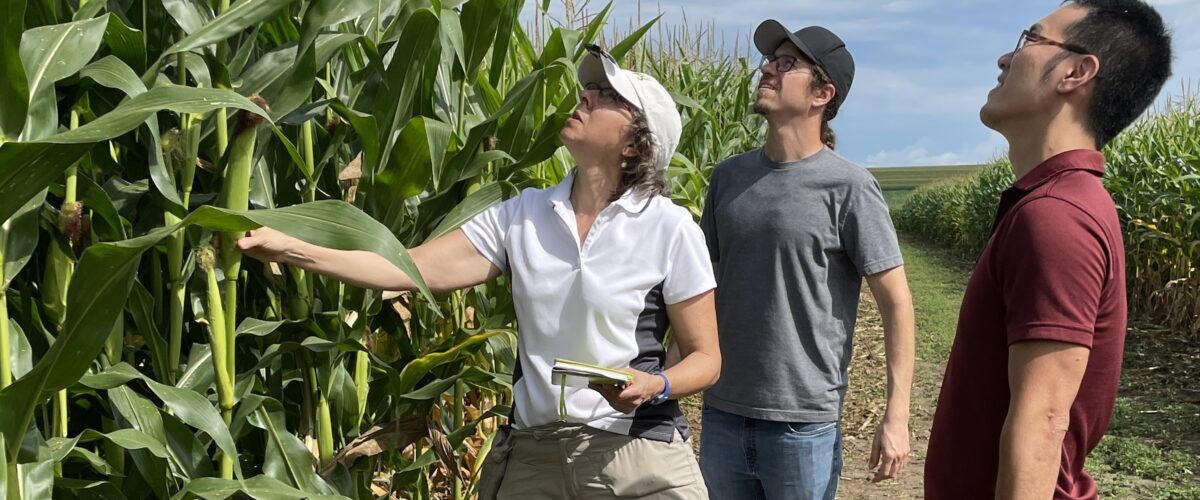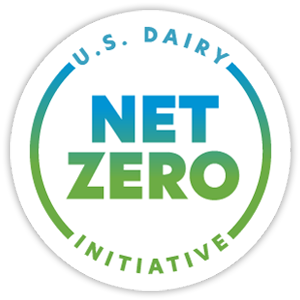
UW-Madison researchers highlight manure and soil conservation experiments
August 1, 2024
Novel manure products are playing a key role in the Dairy Soil & Water Regeneration (DSWR) project, a research initiative on working dairies and research farms across the U.S.
As part of DSWR, the research team at the University of Wisconsin-Madison is evaluating the effects of those manure products and soil conservation practices on greenhouse gas emissions, soil organic carbon storage and soil health parameters such as water infiltration and aggregate stability in corn silage, a forage commonly grown for dairy cattle feed.
On Aug. 1, the team guided project partners from Dairy Management Inc. (DMI) and the Soil Health Institute (SHI) into the study’s fields to show the progress of three DSWR experiments UW-Madison is overseeing at the university’s Arlington Agricultural Research Station in south-central Wisconsin.
The team’s studies include a large-plot experiment to assess the effects of novel manure products and soil conservation practices, a field-scale investigation to understand the interactions between soil management practices and soil hydrology and a large-plot assessment to quantify the amount of nitrogen fertilizer that can be replaced by the manure products. In this case, those products are flocculated solids and evaporative solids.
Comparisons in the studies are made between the manure solids and a more commonly used treatment of liquid dairy manure. The team is also using other soil health management systems that include cover cropping and minimum tillage.
“The whole picture is to understand how these different management strategies can affect the overall picture of soil health, greenhouse gas and corn silage yield and profitability,” UW-Madison scientist Adam von Haden said.
The potential impact of DSWR is significant, he said.
“We’re on the forefront of studying these novel manure products, so the data we’re generating in terms of yields, soil health and greenhouse gas emissions are going to be the first time these things have been recorded,” von Haden said. “This will lay the foundation for future studies and future questions about these manure products as well as giving farmers and policymakers at least a basic understanding of how these products might compare to our current manure products.”
The results will also help to calibrate process-based models, which are being heavily used for carbon ecosystem services markets.
“The interest in (the models) is only growing as agriculture is being recognized as a very important part of mitigating climate change. Dairy farms particularly are going to have a large role because of the generation of methane from the animal portion of their agriculture,” Christine Molling, a modeling specialist at SHI, said.
“Most of the models out there have not been trained on datasets that incorporate these different kinds of manure,” Molling said. “So, one of the great outcomes from this project is we’re going to be able to use the greenhouse gas, the yield and all the other measures from the experiments with the different manure forms to calibrate models to work in dairy forage systems.”
UW-Madison is one of seven universities along with the USDA Agricultural Research Service participating in the DSWR project. Madison’s work has been impressive, said Victor Green, director of soil health and crop sustainability at DMI.
“It’s a real pleasure to work with UW-Madison. … They have a great team here, very well-resourced,” Green said. “We have high expectations for our research, and they’ve met them.”
Photo Caption: Researchers (left, Christine Molling, Adam von Haden, and Jerry Hsiao) inspect the corn at the Arlington site.
